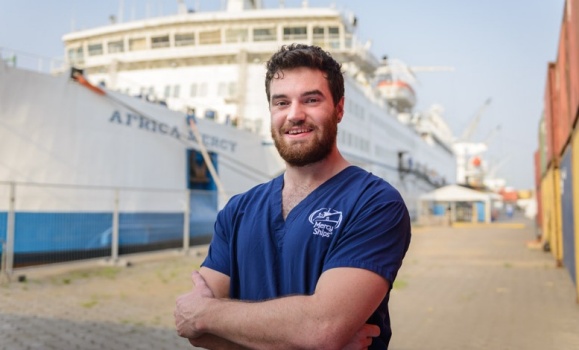News
» Go to news mainWhat it Means to Give Back: Will Creene

Will Creene (BHSc’16 – Radiological Technology) grew up in Bristol, England and moved to NS with his family in 2010. After completing a year of science at Dalhousie University he knew he wanted to work in healthcare and being a tech-minded person he decided to enter the Radiological Technology program, which seemed like a natural fit.
While on vacation in 2016, the girl sitting next to him on a flight out of London told him she was a radiographer on her way to West Africa to volunteer with a humanitarian organization called Mercy Ships. This chance encounter sold him on the organization and a year later he was flying to Douala, Cameroon to work with her as a radiographer on board the world's largest non-governmental hospital ship, the MV Africa Mercy.
Fortunately his employer, the IWK Health Center, was very supportive and granted him two months of unpaid leave for his first trip to Cameroon in 2017, and another month for his second trip to Guinea in 2018. Coworkers, friends, and other contacts at the School of Health Sciences were all hugely supportive and helped Will fundraise for both trips.
Will found the interprofessional collaboration in a hospital ship setting an interesting experience that made for an excellent care environment. It was a relatively small team and there was a huge variety of patients in terms of pathology and demographics, so collaborating as a team was extremely important. Volunteers both live and work on the ship and quickly settle into a community where they can rely on each other. “I've never worked in a setting where interprofessional collaboration was so accessible and so routine; you really get to know your colleagues quickly, whether they are a surgeon, a cook, or the Captain,” he says.
When asked about the overall experience, Will says, “it’s hard to prepare yourself for the level of poverty and the extent of disease in the world's poorest nations. I felt keen and ready when I arrived but nothing can prepare you for it until you're there.” Will felt the most rewarding part of the experience was the love and gratitude received from the patients. “There were no expectation, no demands, simply unconditional gratitude for everything.”
“It's humbling to see people who have gone without for their whole lives. They're so grateful for everything they have, no matter how small. It really makes you take a step back and count your own blessings. The hardest part of it all for me was seeing patients whom we were unable to help. To meet a patient, see their scan, and know that their pathology is too advanced or severe for treatment is heartbreaking, especially when we were usually their last hope.”
From a medical standpoint, he learned more than he could have imagined about the pathology endemic to the developing world; the far-reaching effects of malnutrition, poor sanitation, and limited healthcare access. The greatest lessons, though, were personal ones. “ I learned how lucky we are to have what we have and how much more grateful we could be. Not just in terms of consumer goods, that nice car or even a warm shower, but in terms of the bare necessities that we take for granted. If you have a roof over your head, electricity, running water, a flushing toilet; you're better off than millions of people worldwide. It's easy to think of as some small, far-away place, but it's an everyday reality for a large proportion of the world. There are a billion people in Africa and another billion in India. We think of ourselves as regular people here in Canada but truly we're among the lucky few.”
“Giving back means sharing the gifts we all have with those who could benefit the most from them.” He feels extremely fortunate to have grown up in a country where he had access to education from childhood to University and he’s been able to develop skills and a profession which can help people wherever they are in the world. “Many of the opportunities I've had in life were just a matter of circumstance; from being born in a developed country, to choosing the right profession, all the way down to sitting in the right seat on the right plane at the right time. Giving back is as simple as using those opportunities to improve the circumstances of others.”
Will encourages everyone to consider volunteering with Mercy Ships. There's space for everyone whether a healthcare professional or not. Aside from the hospital, the ship needs volunteer seafarers, engineers, cooks and cleaners to function.
When asked what the future holds, Will is hopeful there will be many more opportunities to keep volunteering and traveling. He will definitely return to Africa with Mercy Ships in the future and hopes to volunteer with other humanitarian organizations as well. “I'd love to work with the Red Cross or Doctors Without Borders (MSF). I'd also really like to do locums abroad in Australia, New Zealand or the US. There is great scope to travel within this profession, and I'm grateful for the opportunities it's given me.”
Recent News
- Bridging continents: Dal students to learn, share and connect in West Africa
- Partnership between UpLift and Public Health sees continued funding allocated for Youth Engagement Coordinators
- Dal Health grad students use podcasting to discover the people behind the science
- Nursing student closer to living out her dream of helping people thanks to support of new award
- Master of Nursing grad passionate about working in mental health and addictions
- MSc Audiology grad shifts career from entomologist to audiologist
- Occupational Science grad exploring concept of care farming
- Dal Crossroads continues 20 year legacy of student ‑led learning
